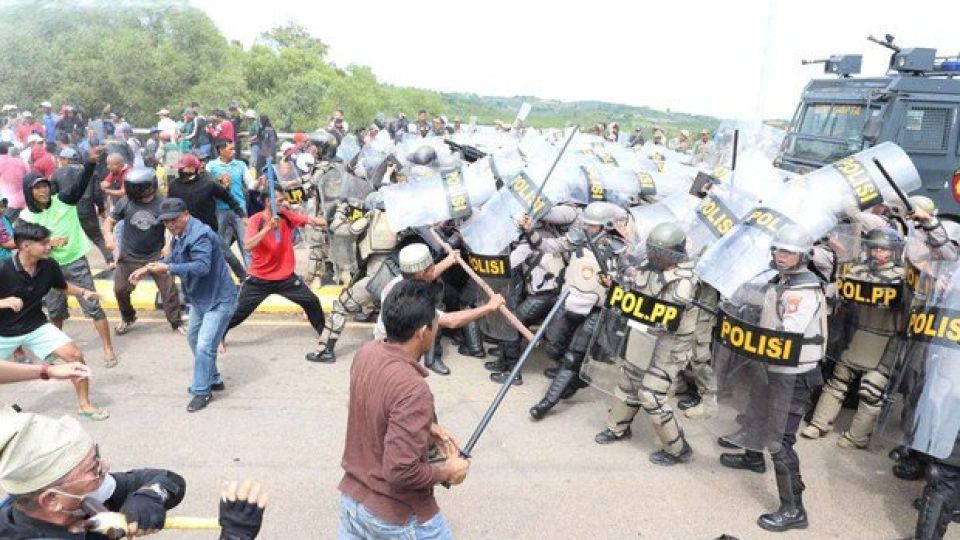September 28, 2023
JAKARTA – The recent conflict in Rempang Island, where locals protested being evicted for the development of a new economic zone, shed light on a worrying trend of state repression in stamping out resistance against national strategic projects.
The government plans to turn the 17,000-hectare Rempang Island, part of Riau Islands province, into a new hub that will house the world’s second largest glass factory and a solar panel manufacturing plant. The plan, however, required the eviction of 10,000 residents of the island.
The locals staged demonstrations that turned into clashes with security forces earlier this month.
Rempang, however, is only the tip of the iceberg. Numerous national strategic projects have involved elements of state repression in their development according to the Indonesian Legal Aid Institute (YLBHI).
The institute has handled at least 106 cases of land conflict between residents and the government over the past six years, involving a total of 800,000 hectares worth of disputed land, according to a report from the YLBHI released on Sunday. Around 1 million people were affected in the cases.
The most common act of state repression in settling land conflicts was the use of physical violence and verbal intimidation, which were found in 48 cases.
The next two most common forms of repression were divide and conquer tactics and criminalization. The latter resulted in 212 people being prosecuted, although it is unclear how many of the cases eventually led to the imprisonment of the suspects.
Read also: Explainer: Rempang conflict reveals weak land ownership system in Indonesia
Similarly, the Agrarian Reform Consortium (KPA) said that national strategic projects planned by President Joko “Jokowi” Widodo’s administration had directly contributed to 73 cases of land dispute over the past three years.
Among the projects were the Rempang Eco-City project, the Mandalika International Circuit in West Nusa Tenggara, the Bulango Ulu Dam in Gorontalo and the Wadas mining project in Central Java.
The KPA recorded 2,710 land dispute cases between 2015 and 2022, which impacted more than 1.8 million families. During the same period, more than 1,600 people were arrested and criminalized, while 842 became victims of violence and 29 others lost their lives.
‘Land hungry’ projects
KPA secretary-general Dewi Kartika slammed Jokowi’s national strategic projects for being “land hungry”, calling the policies shortsighted. Such projects often force the locals, whose land is taken from them, to became low-paid construction laborers.
The land disputes were exacerbated by the government’s decision to set up authority bodies with sweeping powers, Dewi continued, such as the Nusantara Capital City (IKN) Authority that oversees the construction of the new capital city in East Kalimantan and the Lake Toba Authority in North Sumatra.
“The authority given to these new bodies has seemingly allowed them to create their own kingdoms within the country, where abuse of power and land corruption are rampant and have become systemic,” she said during a webinar on Sunday.
The YLBHI also pinned the string of land disputes surrounding the strategic projects on the Jokowi administration’s focus on providing easy access to foreign and private sector investment.
“The series of land conflicts, along with the state repression of its own people, have been caused by a development approach oriented toward profitability, as opposed to [locals’] rights,” the YLBHI wrote in its report.
Read also: Komnas HAM finds indications of rights violations in Rempang
For Rempang, Investment Minister Bahlil Lahadalia said that the government would scale back its development project on the island. The minister went to Rempang last week to hold dialogues with the residents.
“In the initial stage, we will only focus on the development of the industry that will take about 2,300 ha of the island,” Bahlil said after a cabinet meeting on the Rempang project on Monday.
Rempang residents will only be moved to a different part of the island, he added. The original plan would have required moving them to the neighboring Galang island by Sept. 28, the deadline for the Batam Free Trade Zone Authority (BP Batam) to hand over the land-utilization certificate to the project developers.
Bahlil said that the government was open to renegotiating the Sept. 28 relocation deadline.


